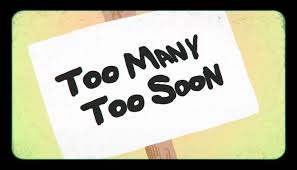中文词源
too 也
来自 to 的强调形式。
英语词源
- too
-
too: [16] Too is historically the same word as to, but the two were not differentiated orthographically until the 16th century. The sense ‘also’ comes from the notion of addition implicit in putting something ‘to’ something else; and ‘addition’ led on to ‘excess’.
=> to - too (adv.)
- "in addition, in excess," late Old English, stressed variant of Old English preposition to "in the direction of, furthermore" (see to). The spelling with -oo is from late 16c. Use after a verb, for emphasis (as in did, too!) is attested from 1914. German zu unites the senses of English to and too. Slang too-too "excessive in social elegance" first recorded 1881. Too much is from 1530s as "more than can be endured;" sense of "excellent" first recorded 1937 in jazz slang.
权威例句
- 1. His hands were too weak to cock his revolver.
- 他的手没劲儿,扳不动左轮手枪的扳机。
- 2. Too bad he used his intelligence for criminal purposes.
- 他把聪明都用在了犯罪上,太可惜了。
- 3. I too am committing myself to continue the fight for justice.
- 我本人也保证将继续为正义而战。
- 4. His wife wasn't feeling too well and she wanted to go home.
- 他的妻子感到有些不舒服,想要回家。
- 5. He drank too much and is paying dearly for it.
- 他现在正为酗酒付出沉重的代价。

